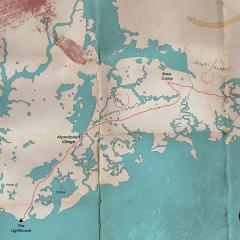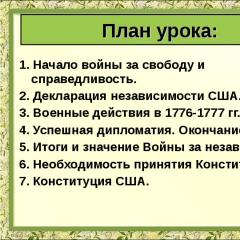Fable Raising a Lion. Fable by I. A. Krylov Raising the Lion
Notes:
First published in New Fables, 1811, pp. 31-34; written no later than February 1811. Autograph of the conclusion: PD(Pushkin collection). Contemporaries considered Krylov's fable to be an allusion to the upbringing of Alexander I (when he was his heir) by the Swiss Laharpe, who raised his student in isolation from Russian life and culture. (See V. Kenevich, “Notes”, p. 100.)
Option ending from the Pushkin Collection (PD):

Notes:
First published in New Fables, 1811, pp. 12-13; written no later than April 1811 (censored March 8, 1811). Autograph: PB-G. According to contemporaries, the fable “Quartet” ridiculed the State Council, which opened on January 1, 1810, divided into four departments: laws (chairman Prince P. Lopukhin), military affairs (gr. A. Arakcheev), civil and spiritual affairs (gr. P. Zavadovsky) and state economy (gr. N. Mordvinov). “It is known that we owe the long debate about how to seat them, and even several subsequent transplants, to Krylov’s witty fable “Quartet” (M. A. Korf, “The Life of Count Speransky.” St. Petersburg, 1861, part 1 , page 118). In the notes to the memoirs of I. Dmitriev, M. Loginov points out: “There is a legend that Krylov wrote his Quartet on this occasion, meaning Mordvinov as Monkey, Zavadovsky as Donkey, Lopukhin as Goat, Arakcheev as Bear” (I I. Dmitriev, “A Look at My Life,” 1861, pp. 292-293).
However, there is another interpretation that relates the “Quartet” to the meetings of the “Conversation”, which opened at the beginning of 1811, also divided into four categories, headed by chairmen. Thus, F. Wigel points out in his memoirs: “Although Krylov betrayed his person to Beseda, they say he secretly laughed at her. Proof of this was provided shortly after its discovery by the fable “Quartet” published by him (“Memoirs”, M., 1893, book III, p. 152).
After verse 32, the following four lines are crossed out (last 4 lines):

Notes:
First published in New Fables, 1816, part V, pp. 10-11; written no later than the beginning of May 1814, as it is in a notebook dated May 12, 1814. Autographs: PD 1, PB-G, PB-O, PB 13, PB 21.
God gave Leo, Caesar of the forests, a son.
You know animal nature:
They, not like us - we have a child a year old,
Even if he were a king, and stupid, and weak, and small;
And the one-year-old Lion Cub
I've been out of diapers for a long time.
So by the year Leo the Father began to think seriously.
So as not to leave my son ignorant,
The Tsar's honor will not be lost in it
And so that when my son has to rule the kingdom,
The people would not scold the father for his son.
Who should I ask, hire or force?
Should the Tsarevich be trained by the Tsar?
Give it to the Fox - the Fox is smart:
Yes, she is a great hunter of lies;
And with a liar there is torment in every matter:
So this, the Tsar thought, is not royal science.
Give it to Mole: there was a rumor about him,
That he loves great order in everything:
You can’t take a step without feeling
And every grain for your table
He cleans himself, he peels himself;
And in a word, glory went
That the Mole is a great beast for small things:
Trouble is only under the nose of the mole's eyes,
Yes, into the distance, they don’t see anything;
The order of the Moles is good, but for him;
And the kingdom of the Lion is much larger than a mink.
Shouldn't we take Barca? Leopard is brave and strong,
And moreover, he is a great tactician;
Yes, Bars doesn’t know politics:
Doesn't understand civil rights at all
What lessons to reign he will teach!
The king must be a judge, minister and warrior,
And Bars is only too keen on cutting himself:
So he is not worthy to teach the royal children.
In short: all the animals, and even the Elephant himself,
Who was honored in the forests,
Like in Greece Plato*,
Lev still seemed not smart
And not a scientist.
Fortunately or not (we'll see that soon),
Having heard about the king's grief,
The same king, the king of birds, Eagle,
who led
With Leo there is affection and friendship,
To do a great service for a friend
And he volunteered to raise the Lion Cub himself.
Leo felt like a mountain had been lifted off his shoulders.
And truly: what seemed better
Should the Tsarevich find a Tsar as a teacher?
Here the Lion Cub has been equipped
And they let me go
Learn to reign to the Eagle.
A year and two pass; between those who are asked,
Everyone only hears praise about the Lion Cub:
All the birds spread wonders about him in the forests.
And finally the urgent year comes,
The Lion King sends for his son.
The son appeared; here the king gathers all the people,
He calls both small and large;
He kisses and hugs his son,
And he says to him like this: “Dear son,
For me, you are the only heir;
I’m already looking into the coffin, and you’re just entering the light!
So I will willingly hand over the kingdom to you.
Now tell us in front of everyone,
What have you learned, what do you know?
And how do you make your people happy?!”
“Dad,” the son answered, “I know that
What no one here knows:
And from Eagle to Quail,
Where is there more water for a bird?
Which one of them lives on what?
What kind of eggs does it lay?
And I will count all the bird’s needs down to the last needle.
Here is my certificate from the teachers:
It’s not for nothing that birds say,
That I grab stars from the sky;
When are you going to hand over the reign to me?
Then I will immediately begin to teach the animals
Make nests."
Then the king and the whole animal world gasped;
The Council hung their heads,
And Leo the old man realized it too late,
That the Lion Cub learned trifles
And what he says is not good;
That there is no great benefit to knowing the life of birds,
Whom nature has appointed to own animals,
And what is the most important science for kings:
Know the nature of your people
And the benefits of your land. *
* Plato is an ancient Greek philosopher, student of Socrates.
* In the fable, contemporaries saw a hint of the upbringing of Alexander I. “His upbringing was one of Catherine’s great mistakes. She entrusted the education of his mind to the Genevan Laharpe, who, leaving Russia, knew her as little as on the day of his arrival" (F. F. Vigel. Notes. Part 2. M., 1892. P. 7).
To Leo, Caesar of the forests, God gave a son.
You know animal nature:
They, not like us, have a child a year old,
Even if he were a king, and stupid, and weak, and small;
And the one-year-old Lion Cub
I've been out of diapers for a long time.
So by the year Leo the Father began to think seriously.
So as not to leave my son ignorant,
The Tsar's honor will not be lost in it
And so that when my son has to rule the kingdom,
The people would not scold the father for his son.
Who should I ask, hire or force?
Should the Tsarevich be trained by the Tsar?
Give it to the Fox - the Fox is smart:
Yes, she is a great hunter of lies;
And with a liar there is torment in every matter:
So this, the Tsar thought, is not royal science.
Give it to Mole: there was a rumor about him,
That he loves great order in everything:
You can't take a step without touching it
And every grain for your table
He cleans himself, he peels himself;
And in a word, glory went
That the Mole is a great beast for small things:
Trouble is only under the nose of the mole's eyes,
Yes, into the distance, they don’t see anything;
The order of the Moles is good, but for him;
And the kingdom of the Lion is much larger than a mink.
Shouldn't we take Barca? Leopard is brave and strong,
And moreover, he is a great tactician;
Yes, Bars doesn’t know politics:
Doesn't understand civil rights at all
What lessons to reign he will teach!
The king must be a judge, minister and warrior,
And Bars is only too keen on cutting himself:
So he is not worthy to teach the royal children.
In short: all the animals, and even the Elephant himself,
Who was revered in the forests,
Like Plato in Greece,
Lev still seemed not smart
And not a scientist.
Fortunately or not (we'll see that soon),
Having heard about the king's grief,
The same king, the king of birds. Eagle,
who led
With Leo there is affection and friendship,
To do a great service for a friend
And he volunteered to raise the Lion Cub himself.
Leo felt like a mountain had been lifted off his shoulders.
And truly: what seemed better
Should the Tsarevich find a Tsar as a teacher?
Here the Lion Cub has been equipped
And they let me go
Learn to reign to the Eagle.
A year and two pass; between those who are asked,
Everyone only hears praise about the Lion Cub:
All the birds spread wonders about him in the forests.
And finally the urgent year comes,
The Lion King sends for his son.
The son appeared; here the king gathers all the people,
He calls both small and large;
He kisses and hugs his son,
And he says to him like this: “Dear son,
For me, you are the only heir;
I’m already looking into the coffin, and you’re just entering the light!
So I will willingly hand over the kingdom to you.
Now tell us in front of everyone,
What have you learned, what do you know?
And how do you make your people happy?!
“Dad,” answered the son, “I know that
What no one here knows:
And from Eagle to Quail,
Where is there more water for a bird?
Which one lives on what?
What kind of eggs does it lay?
And I will count all the bird’s needs down to the last needle.
Here is my certificate from the teachers:
It’s not for nothing that birds say,
That I grab stars from the sky;
When are you going to hand over the reign to me?
Then I will immediately begin to teach the animals
Make nests."
Then the king and the whole animal world gasped;
The Council hung their heads,
And Leo the old man realized it too late,
That the Lion Cub learned trifles
And what he says is not good;
That there is no great benefit to knowing the life of birds,
Whom nature has appointed to own animals,
And what is the most important science for kings:
Know the nature of your people
And the benefits of your land.
The fable “The Education of the Lion” was written by Krylov in 1811. In the same year it was published in the publication “New Fables”. The fable is based on an original plot. The king of beasts, Leo, wanting to give his lion cub son a proper education and prepare him to rule his people, thinks about who to send his son to study.
According to his thoughts, the Fox was smart, but she loved to lie too much, and lies are unacceptable for the king. The mole is very hardworking and loves order, but the problem is that he can’t see anything beyond his own nose. And the king of beasts must be far-sighted. Lev also rejected Bars, who, although he was strong and courageous, did not understand anything about politics and legal matters. Elephant was also not suitable for the position of teacher.
Having learned about Leo's difficulties in choosing a teacher for his son, the king of birds, the Eagle, comes to his aid. He agrees to take young Leo into training. The training is going well and only positive feedback about the student is heard from all the birds. When the young Leo returned home, it turned out that he thoroughly knew all the needs of birds and was ready, as soon as he ascended the throne, to teach animals the art of making nests. At the end of the fable, Krylov directly expresses the main idea of the fable:
“The most important science for kings is
Know the nature of your people
And the benefits of your land"
The fable “The Education of the Lion” was written, admittedly, based on a certain fact, namely, about the upbringing that Catherine gave Alexander I. As is known, the main educator of Alexander I was the Swiss Laharpe, from whom the future emperor adopted the latest humanitarian ideas that reigned in France at that time, and to whom he owed his development. But an educated foreigner could not give him knowledge of Russia, which, however, his other Russian educators did not give him. This ignorance of the Fatherland explains Alexander’s unsuccessful attempts to implement his liberal views. This serious gap in the upbringing of Alexander Krylov is depicted in his fable.
In his judgment about the upbringing of Emperor Alexander, Krylov fully shares the point of view of the then conservatives, according to whom the upbringing of Alexander was one of Catherine’s great mistakes. Of course, La Harpe did not and could not know Russia, but he was not the only teacher of the future emperor. If his student did not learn from his school an accurate and true concept of the urgent needs of his state and people, then the blame for this falls much more on Alexander’s Russian mentors, who were unable or did not want to fill this important gap.
However, it should be taken into account that, despite the short duration of training with La Harpe and his somewhat ambiguous position at court, the influence of this Genevan on his pupil was very strong, which is explained by La Harpe’s mental superiority over other mentors, and most importantly - the very idea of his lessons that corresponded to the best spiritual inclinations of young Alexander. Classes with La Harpe introduced him to the life and ideals of the ancient world, to the ideas of European thinkers and had an elevating effect on the receptive, dreamy soul of the heir.
One thing is indisputable: under the conditions of that time, neither domestic nor foreign mentors, nor administrators who had thoroughly studied court science, nor men of science who drew their knowledge mainly from the ancients could give Alexander a real, living acquaintance with the situation and needs of the people. and new European classics. Even knowledge of the general course of historical development in relation to the native country, a thorough acquaintance with the past of the people, with their social and spiritual life for a number of centuries, at the level of historical knowledge at the end of the 18th century, was incomplete, fragmentary, superficial and one-sided.
Krylov’s fable “The Education of Leo” expresses the idea of national identity and shows the unacceptability of foreign knowledge for educating the future ruler of the Russian Empire.



